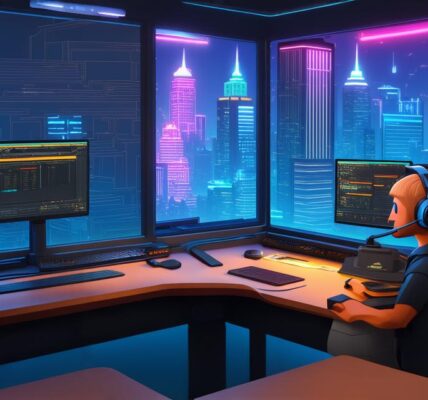Introduction
The world of video games is constantly evolving, and the role of the designer is becoming increasingly important. With advancements in technology, new game engines, and an ever-growing audience, there has never been a better time to become a video game designer. However, the question remains: what education do video game designers have?
Formal Degrees
One of the most common ways for individuals to become video game designers is by earning a degree in a related field. These fields include computer science, game design, interactive entertainment, and animation.
Computer science degrees focus on programming and coding, which are crucial skills for any video game designer. Game design degrees, on the other hand, offer a more specialized curriculum that covers the technical and creative aspects of game development. Interactive entertainment and animation degrees provide students with a broader understanding of the industry, including the use of 3D modeling, texturing, and rigging.
A formal education in these fields can provide video game designers with a strong foundation of knowledge and skills that will serve them well throughout their careers. These degrees also offer networking opportunities and access to internships and job openings within the industry.
Certifications
In addition to formal degrees, there are several certifications available for video game designers. These certifications can help demonstrate an individual’s proficiency in specific areas of game development, such as programming or level design.
One example of a certification program is the Game Development Certificate from Udemy. This program offers courses on topics such as game engines, programming languages, and game art. Students who complete the program receive a certificate that they can use to demonstrate their skills to potential employers.
Bootcamps
Another option for individuals looking to become video game designers is to attend a bootcamp. A bootcamp is an intensive training program that typically lasts between 12-18 weeks and focuses on teaching students the skills they need to build a game from scratch.

Bootcamps can be a great way for individuals to learn new skills quickly and gain hands-on experience in game development. They also provide an opportunity for students to network with other like-minded individuals and potentially secure job opportunities upon completion of the program.
Self-Study
For those who prefer to learn at their own pace, self-study is a viable option. There are numerous resources available online for individuals looking to become video game designers, including tutorials, courses, and forums.
One example of an excellent resource for self-study is the Unity game engine. Unity is one of the most popular game engines used in the industry, and it offers a wide range of tutorials and resources for beginners. It also has a large community of developers who can offer guidance and support to those looking to learn the platform.
Case Studies
To better understand how education contributes to the success of video game designers, let’s take a look at some case studies of successful individuals in the industry.
FAQs
What types of education can individuals pursue to become video game designers?
Individuals can pursue formal degrees in computer science, game design, interactive entertainment, and animation, as well as certifications and bootcamps in game development. Self-study is also a viable option for those who prefer to learn at their own pace.
What are some examples of successful video game designers with non-traditional educational backgrounds?
Jonathan Blow has a degree in philosophy, while Markus Persson attended the Royal Institute of Technology in Stockholm before dropping out to focus on game development.
Conclusion
The world of video games is constantly evolving, and the role of the designer is becoming increasingly important. With advancements in technology, new game engines, and an ever-growing audience, there has never been a better time to become a video game designer.




